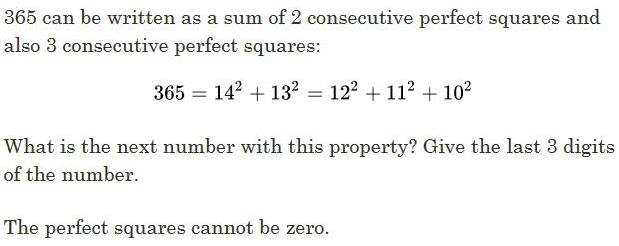This is a math problem I came across the other day:
$365$ can be written as a sum of two and also three consecutive perfect squares:
$365=14^2+13^2=12^2+11^2+10^2$
$$365=14^2+13^2=12^2+11^2+10^2$$ What is the next number with this property? Give the last 4 digits of the number. The The perfect squares cannot be zero.
I would like to know what would be a good way (esp.especially performance-wise) to check allthe first, letslet's say, 1000000,$1000000$ natural numbers if they can be represented in the way above, using Mathematica?

